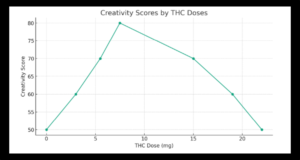Have you ever wondered if there’s truth to the idea that cannabis can spark creativity? This question has captured the imagination of artists, writers, and everyday dreamers for decades. Anecdotes and testimonials have long fueled the debate, with some of the most innovative minds in history, like Steve Jobs, attributing part of their creative success to the effects of cannabis. But what does science say about this? Can a puff really lead to a creative jolt, or is it just smoke and mirrors? Let’s dive into the intriguing relationship between cannabis and creativity, guided by scientific research, to uncover whether THC—the main psychoactive compound in cannabis—can indeed enhance the creative process.
The perception that cannabis can enhance creativity is widespread, with stories of cannabis-induced epiphanies and unconventional ideas being common among users. This perception is not unfounded, as certain studies suggest that THC can influence creativity – but it’s a bit more complicated than a simple yes or no.
THC might help with creativity through its influence on dopamine levels in the brain. Optimal levels of dopamine, the brain’s pleasure and motivation messenger, can lead to better creative thinking. For people with naturally lower levels of dopamine, a bit of THC could potentially be a boost, acting like a volume knob to set the levels just right.
Furthermore, THC’s effect on inhibitory control could also play a role. Usually, our brains filter and regulate thoughts—a kind of quality control for ideas. THC might lower the strength of this filter, allowing for a freer flow of creative thoughts.
Alright, let’s break down some of the key points about how cannabis might improve creativity, explained in a way that’s easy to follow:
- Creativity and Cannabis: Some people, including famous innovators like Steve Jobs, have said that using cannabis helps them think of unique and unusual ideas. This is because cannabis contains THC, a substance that can change how our brain works.
- How THC Might Help: THC might help with creativity by:
- Letting Dopamine Flow: Dopamine is like a messenger in our brains that helps us feel pleasure and think up new ideas. THC might help release more dopamine, which could lead to better creative thinking, especially for those who naturally have less dopamine.
- Lowering Inner Critic: THC can make it easier for your brain to let go of strict self-control. This means your brain doesn’t say “no” as much, and more creative ideas can come out.
- Changing Control States: Our brain can either be very focused and controlled or more free and open. THC might shift the brain towards being more open and less controlled, which can be good for coming up with many different ideas (divergent thinking).
- Different Kinds of Creativity: There are two types:
- Divergent Thinking: Like brainstorming, coming up with many answers to one question. THC might be good for this, as long as it’s not too much.
- Convergent Thinking: Finding one specific answer to a clear question. THC might not be as helpful here and could even make it harder.
- The Right Amount Matters: Just like with anything, too much can be a bad thing. A little THC might help with divergent thinking, but too much can actually make it worse.
- What Studies Say: Some studies found that a little THC improved how many ideas people could come up with or how original their ideas were. But other studies didn’t find any improvement, or they found that too much THC could make creative thinking worse.
- It’s Complicated: There are a lot of factors, like how much THC you take, how it’s taken, and a person’s history with cannabis, that can change how it affects creativity. Plus, our mood can also play a role.
In simple terms, while there’s a chance that a small amount of THC could help some people be more creative, it’s not guaranteed, and using too much could actually do the opposite.

Creativity Scores were highest with 5mg to 10mg THC Dose
Scientific Studies
The studies mentioned in the discussion that observed some positive effects of low THC on creativity are:
- Weckowicz et al. (1975): This study reported that subjects who were intoxicated with joints containing a low dose of THC (3 mg in total) showed significantly enhanced performance on two divergent production tasks compared to those who received a higher dose of THC (6 mg in total).
- Curran et al. (2002): In this research, oral THC at doses of 7.5 and 15 mg was found to dose-dependently improve verbal fluency, which is an important component of divergent thinking.
- Schafer et al. (2012): This study indicated a beneficial effect of smoked cannabis (with an average of 10% THC content) on divergent thinking, but this was limited to users who were low in trait creativity, as determined by a self-assessment questionnaire.
- Block et al. (1992): This research found that after the administration of cannabis (joints containing 19 mg of THC), participants had an increase in the number of original responses on a test of associative processes compared to a placebo group.
These studies suggest that THC may have the potential to induce a cognitive control state that can decrease competition between cognitive representations, thus potentially enhancing divergent thinking, particularly at lower doses. However, it’s important to note that the results are mixed, and not all studies have found that THC improves creativity. The impact of THC on creativity appears to be complex and influenced by many variables, including dosage, individual differences in response to THC, and the context in which cannabis is used.
DEEP DIVES
The Study
“Divergent thinking performance is expected to be optimal with medium subcortical DA levels (Akbari Chermahini and Hommel 2010), one may suspect that THC can have a beneficial effect on this creative process, particularly in individuals with low dopaminergic functioning. This assumption is further supported by the fact that the reduction in inhibitory control, as observed in response to stimulation by pure THC (McDonald et al. 2003) and cannabis (Ramaekers et al. 2006; Ramaekers et al. 2009), has been related to dopaminergic functioning as well (Mink 1996). Reduced inhibitory control can be considered to reflect a cognitive control state with weak top-down guidance.”
What’s That Mean?
Imagine your brain has a volume knob for creativity, controlled by a chemical called dopamine. When this knob is set at a medium level—not too high, not too low—your creativity flows best. This is what we call “divergent thinking,” where you come up with lots of different ideas.
Now, THC, the stuff in cannabis that gets you high, can turn this volume knob. For some people whose knob is naturally set too low (meaning they don’t have enough dopamine), THC might give them a boost and help them be more creative. This is because THC can make it easier for your brain to stop being so strict with its rules, allowing more free-flowing thoughts.
But like playing music too loudly, if the knob is turned too high, it’s not helpful. That’s what the study found with strong cannabis—it turned the creativity knob up too high, which wasn’t good for coming up with new ideas.
